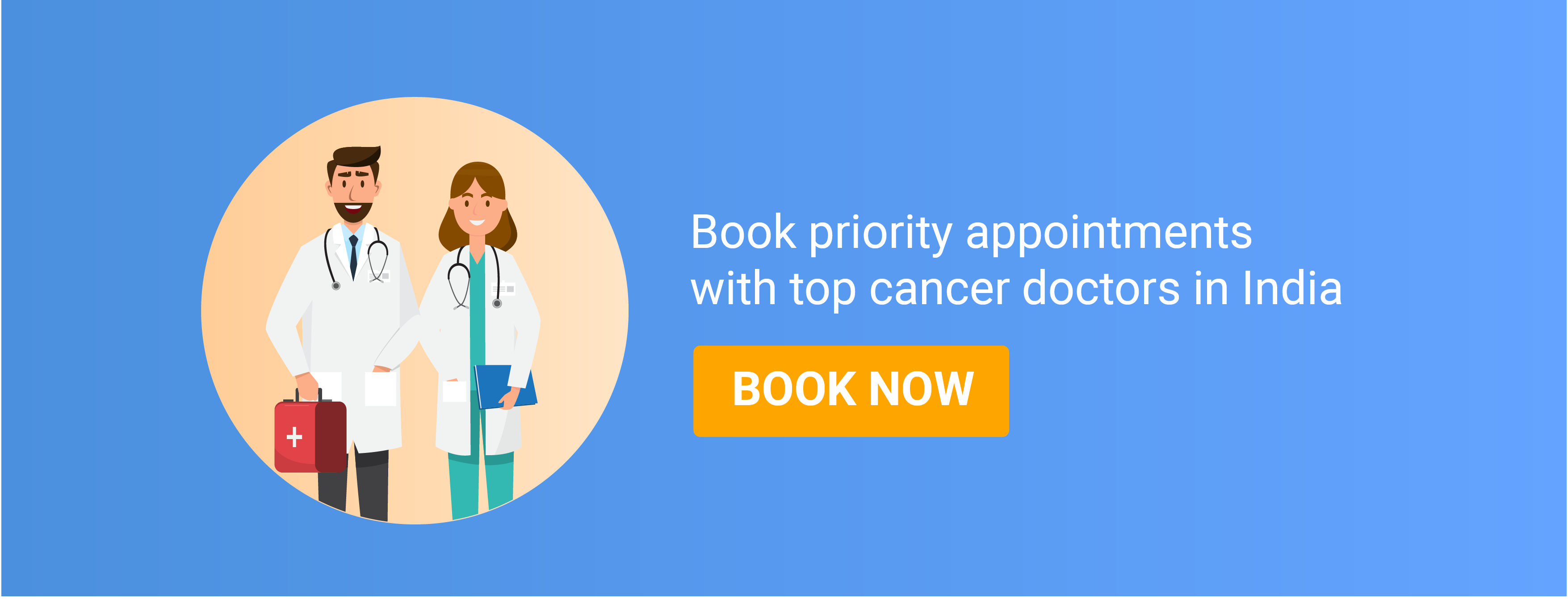Breast cancer is the most common cancer affecting women in India, with as many as 1.7 lakh new patients diagnosed every year. Almost half of this number, around 80,000 women succumb to this disease every year, which is very high compared to western countries.
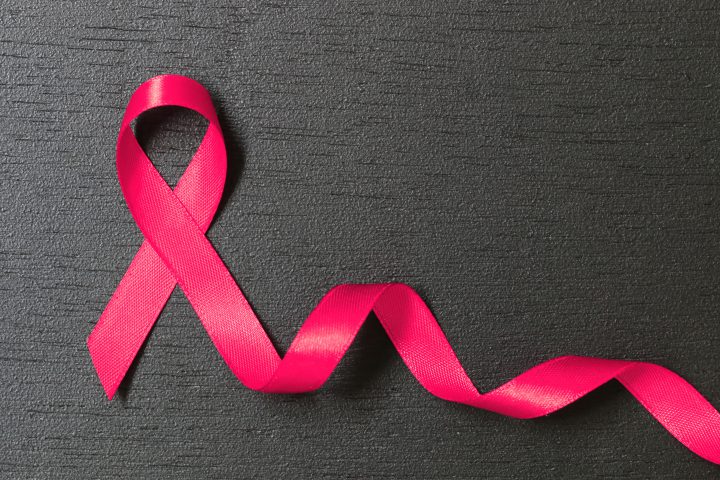 A lot of new and effective treatment modalities are available in India but we still see poor results in terms of survival for breast cancer. It is important to understand the reasons for such poor survival outcomes in India. Through this article, we will try to help readers understand breast cancer and its treatment.
A lot of new and effective treatment modalities are available in India but we still see poor results in terms of survival for breast cancer. It is important to understand the reasons for such poor survival outcomes in India. Through this article, we will try to help readers understand breast cancer and its treatment.
Doctors now have a decent understanding of the biology of breast cancer and what drives them at cell and molecular level and the more we know it, the more complex it appears. Still, for a majority of patients, the present level of understanding has helped us device adequate treatment measures to have favourable results.
How do Cells Grow in Breast Cancer?
Like any cancer, the breast cancer develops from uncontrolled growth of abnormal cells that eventually form a tumour. These abnormal cells can arise from various factors like abnormal gene activation, for example BRCA1/BRCA2 gene, or a random mutation in the cell DNA that triggers growth of these cells, and some contributing factors add to the damage.
Sometimes the cancer cells need an external trigger to keep growing and this can be in different forms of certain chemicals from within the tumour or the blood. When these chemicals come in contact with cancer cells they initiate a reaction that stimulates the cell growth process indiscriminately.
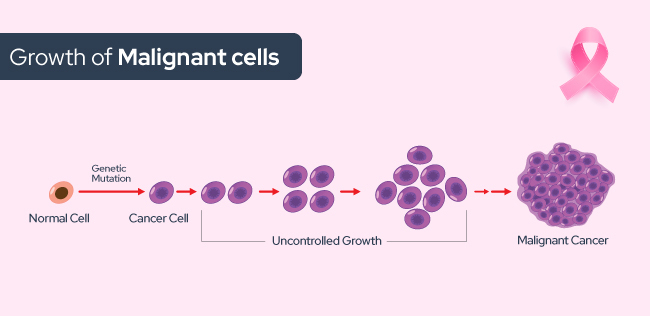
Other times, the cancerous cells in breast cancer may get stimulus to grow further from certain hormones in the body like estrogen and progesterone. These are normally present in our body and help with various functions in females, but they may contribute to cancer growth as we would understand further. Her-2neu is another protein that triggers growth of cancer cells if it is present in excess. All these can be tested to know if breast cancer in a particular patient is sensitive to estrogen, progesterone or excess of her-2neu. Furthermore, the breast cancer cells may not have any such feature of growth to estrogen, progesterone or Her2neu chemicals, and this is called a triple negative breast cancer.
How is Breast Cancer Treated?
Breast cancer treatment can involve a combination of many treatments including surgery, radiotherapy, chemotherapy, hormone therapy and targeted therapy, depending upon the stage of the disease, and other features.
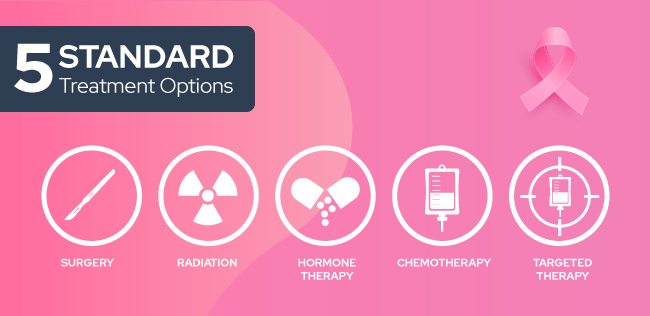
Surgery for Breast Cancer
Surgery can involve removal of the tumour inside the breast or the entire breast with tumour depending upon the stage of the tumour and other factors. Types of surgery performed include lumpectomy or wide local excision (both called breast conserving surgeries) when only a tumour with some healthy tissue margin is cut out. Limited or complete dissection of lymph nodes in the axilla (underarms) is performed along with breast conserving surgeries depending upon the extent of involvement of lymph nodes. Mastectomy (complete removal of the entire breast along with the lymph nodes in the underarms) is advised depending upon the size and location of tumour. If the disease is advanced, the doctor may first advise few cycles of chemotherapy before surgery to help reduce the size and extent of cancer.
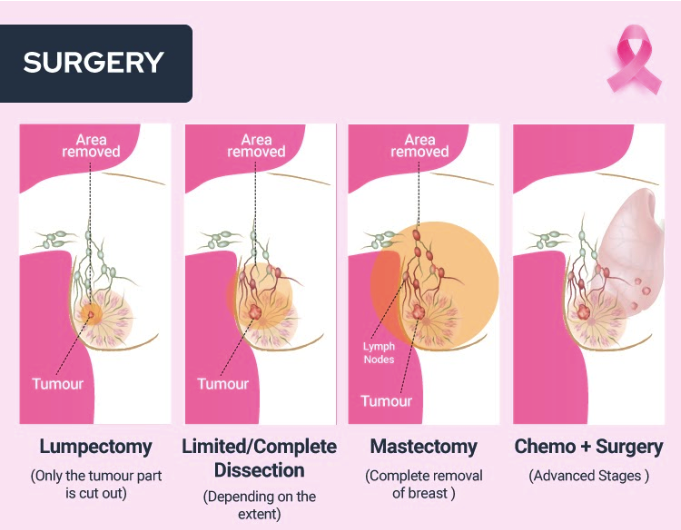
What Tests are Done After Breast Cancer Surgery?
After the surgery, the tumour is evaluated for nature of cancer, lymph node involvement, etc. for staging. Doctors also evaluate the tumour for presence of various molecular features through Immunohistochemistry (IHC) test to plan further treatment. Once doctors have a clear understanding of the biological nature of disease in terms of presence or absence of estrogen receptor (ER), progesterone receptor (PR) or her2neu along with stage of disease, the further treatment is planned.
Others include testing for blood cell counts, haemoglobin, 2D echocardiography for testing heart function, serum creatinine testing for kidney function, liver function tests, etc.
What is Chemotherapy?
Chemotherapy involves the use of drugs that kill actively dividing cancer cells in the body and as these drugs are injected into the blood carrying veins, they reach everywhere and cause damage to the cancer cells. Additionally, since the chemotherapy drugs affect all cells that are actively dividing we sometimes see side effects to these drugs such as hair loss (cells in the hair follicles divide actively) or vomiting and diarrhea (cells in our gut also divide actively) or haemoglobin and white cells as the drugs affect blood forming cells in the body. Chemotherapy is used based on various factors like the stage, age of patient, other diseases if any, etc. The chemotherapy may be given in 4, 8 or 12 sittings on a frequency of every three weeks or weekly. Ask your treating medical oncologist for more details.
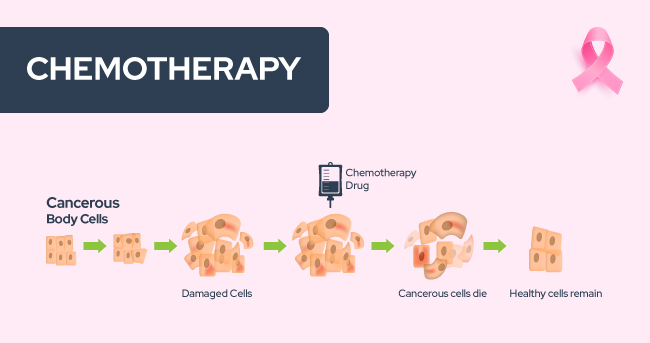
What is Hormone Therapy?
When a patient’s tumour shows positive sensitivity to estrogen or progesterone hormones, it is labelled as hormone receptor positive breast cancer and the doctors add drugs that block the receptors on cancer cells that react with the hormones. This way the drugs prevent tumour growth activation by these hormones. Normally such drugs are given for a duration of 5-10 years.
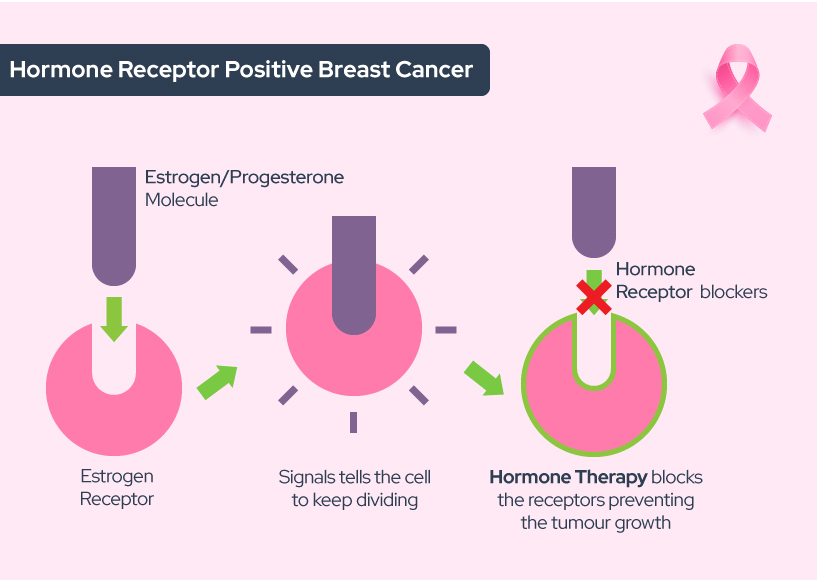
What is Targeted Therapy?
If the tumour shows the presence of excess of her2neu protein, the doctors add a targeted drug called Trastuzumab (that blocks this protein and its stimulation of growth of cancer cells) with the purpose to minimise the possibility of the cancer growth or recurrence. This drug is given by injections on weekly or three weekly frequency for a period of one year or up to progression of disease depending upon the stage of cancer. Targeted drugs identify a specific molecule on cancer cells and attach to it causing damage and dysfunction. This way, the drugs do not affect the healthy, non-cancerous cells in the body, thereby limiting side effects.
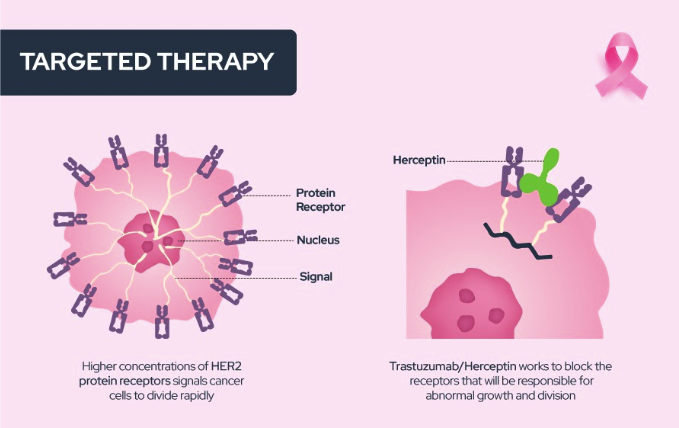
What is Triple Negative Breast Cancer?
Sometimes (in 10-15% cases) the cancer may not show features of any sensitivity to estrogen, progesterone or Her2neu receptors. This is called a Triple Negative Breast Cancer (TNBC). These tumours are aggressive in nature and tend to recur or metastasize early. Unfortunately, since there are no known triggering factors for such cancers, the available targeted agents or hormone therapy cannot be used for these patients and chemotherapy is the only option.
What is Radiotherapy or Radiation Treatment?
Radiation treatment or Radiotherapy involves the use of high energy X-rays or electrons or protons to kill the cancer cells. X-ray radiotherapy with electron radiotherapy is used to kill the cancer cells in the vicinity of tumour in the breast.
Decision on whether to treat with radiotherapy is taken based upon the type of surgery done and the stage of cancer. Radiotherapy is generally always advised if patient underwent any breast conserving surgeries (lumpectomy or wide local excision). Sometimes the doctors may include radiotherapy for underarms depending upon number of lymph nodes affected by cancer.
Radiotherapy may also be used in advanced stage when disease has spread to other parts of the body. Radiotherapy may be used when the disease has spread to the brain, bones to reduce symptoms or more aggressively when there are very few lesions in brain, lungs or liver. A more detailed discussion with your treating doctors will help better understand your options.
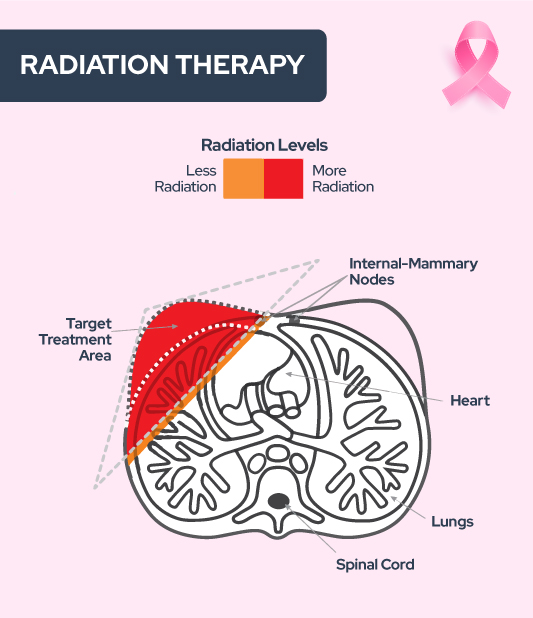
Take Home Messages:
- Breast cancer is a complex disease and should be treated by a multidisciplinary team of experts including surgical oncologists, radiation oncologists and medical oncologists.
- Treatment of breast cancer may include a combination of surgery, chemotherapy, radiotherapy, hormone therapy and targeted therapy depending upon many factors.
- Immunohistochemistry (IHC) test is an important test done on tumour/cancer cells after biopsy or surgery to understand and plan further treatment.
- Breast cancer is curable, if diagnosed early and treated correctly. Always discuss all your options, ensure there is a clear understanding of the cancer and plan the whole treatment in time. Never skip any treatment – a half treatment is equal to no treatment.
